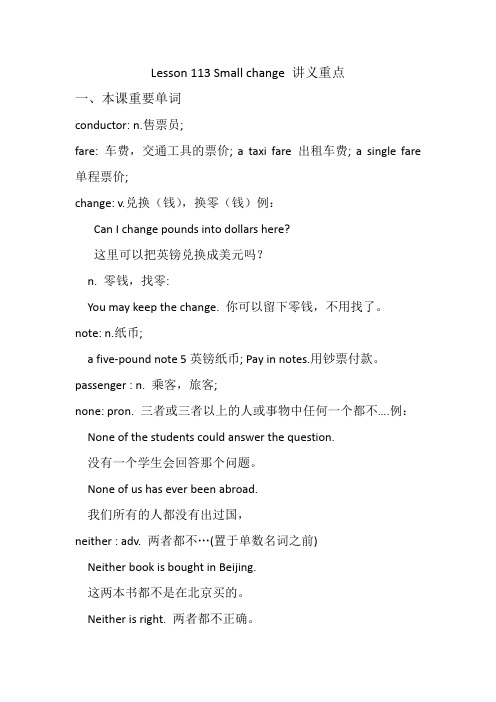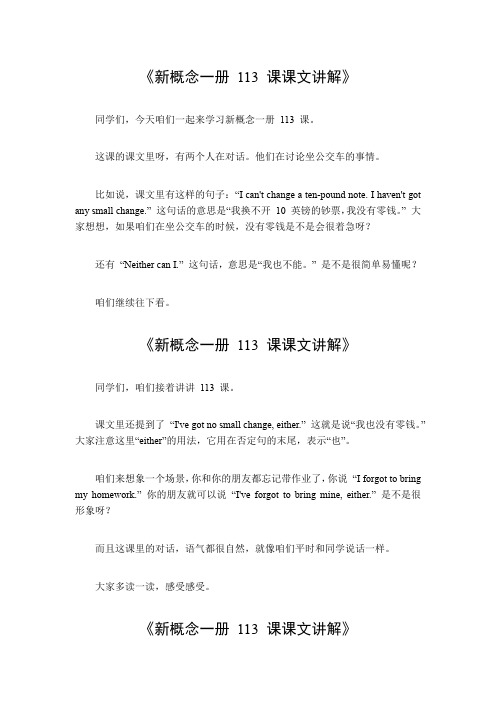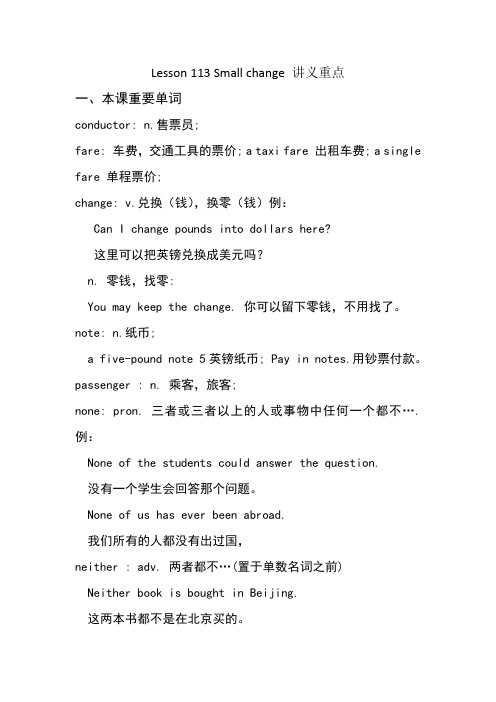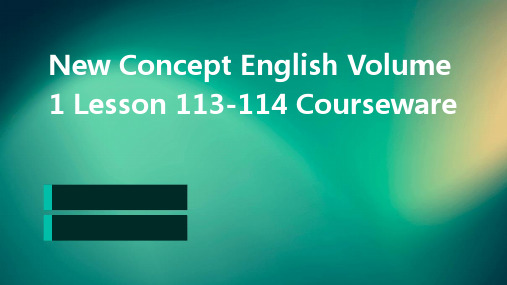新概念英语113课讲义
新概念英语一113课讲义

Lesson 113 Small change 讲义重点一、本课重要单词conductor: n.售票员;fare: 车费,交通工具的票价; a taxi fare 出租车费; a single fare 单程票价;change: v.兑换(钱),换零(钱)例:Can I change pounds into dollars here?这里可以把英镑兑换成美元吗?n. 零钱,找零:You may keep the change. 你可以留下零钱,不用找了。
note: n.纸币;a five-pound note 5英镑纸币; Pay in notes.用钞票付款。
passenger : n. 乘客,旅客;none: pron. 三者或三者以上的人或事物中任何一个都不….例:None of the students could answer the question.没有一个学生会回答那个问题。
None of us has ever been abroad.我们所有的人都没有出过国,neither : adv. 两者都不…(置于单数名词之前)Neither book is bought in Beijing.这两本书都不是在北京买的。
Neither is right. 两者都不正确。
get off:下车;tramp: n. 流浪汉,漂泊者’except : prep. 除…之外;二、本课重要知识点:1. Have you any small change? 您有零钱吗?在本句中关于have变疑问句的用法需要引起注意:(1)have用作实意动词表示状态,如表示拥有、患病或用于have to 表示“必须”等,在变疑问句时可以直接将have提前,也可根据情况在句首使用do,does,did,例:I have some small change. 我有一些零钱,变疑问句:常用句式:Do you have any small change?您有零钱吗?不常见句式:Have you any small change? 您有零钱吗?(2)用作实意动词表示动作,如表示“吃(=eat)”、“喝(=drink)”、“度过(=spend)”等,构成疑问式时不能将have提前至句首,而应在句首使用do,does,did,例:He has breakfast at home. 变为疑问句:正确句式:Does he have breakfast at home?他在家吃早餐吗?错误句式:Has he breakfast at home?2. Neither can I. 我也不能。
新概念一册113课课文讲解

《新概念一册113 课课文讲解》同学们,今天咱们一起来学习新概念一册113 课。
这课的课文里呀,有两个人在对话。
他们在讨论坐公交车的事情。
比如说,课文里有这样的句子:“I can't change a ten-pound note. I haven't got any small change.” 这句话的意思是“我换不开10 英镑的钞票,我没有零钱。
” 大家想想,如果咱们在坐公交车的时候,没有零钱是不是会很着急呀?还有“Neither can I.” 这句话,意思是“我也不能。
” 是不是很简单易懂呢?咱们继续往下看。
《新概念一册113 课课文讲解》同学们,咱们接着讲讲113 课。
课文里还提到了“I've got no small change, either.” 这就是说“我也没有零钱。
” 大家注意这里“either”的用法,它用在否定句的末尾,表示“也”。
咱们来想象一个场景,你和你的朋友都忘记带作业了,你说“I forgot to bring my homework.” 你的朋友就可以说“I've forgot to bring mine, either.” 是不是很形象呀?而且这课里的对话,语气都很自然,就像咱们平时和同学说话一样。
大家多读一读,感受感受。
《新概念一册113 课课文讲解》同学们,咱们再来说说113 课。
课文里的人物因为没有零钱,可能会有点小烦恼。
那咱们在生活中也要注意准备好零钱哦。
比如说,有一次小明坐公交车,发现自己没有零钱,幸好旁边的好心阿姨帮他换了,才顺利上了车。
这课的课文虽然不长,但是很实用。
大家要多读多练,把里面的句子都记住,以后遇到类似的情况就能轻松应对啦。
同学们,加油!相信你们能学好这一课。
新概念英语第1册课程讲义Lesson113-114

Lesson 113 单词讲解1. conductor: 售票员2. fare: 车费,车票A. 车费:the bus\train\taxi\air fareHe didn't have enough money to pay his train fare.B. 车票:Tickets\ Fares, please.3. change: 兑换(钱)A. v. 兑换(不同面值)Can you change a ten-pound note?B. v. 兑换(不同货币)Where can I change my English money into dollars?change…into…B. n. 找回的钱、零钱(不可数)I want my change.Do you have any small change?4. note: 纸币coin: 硬币a fifty-pound notea fifty pounds notetwo fifty-pound notestwo fifty pounds notesa fifty-cent coina fifty cents cointhree fifty-cent coinsthree fifty cents coins5. passenger: 乘客6. none: 没有任何东西no-not- never- none- negative-neithernone= no+ n.He has no money, no girlfriend, no house.He has none.7. neither: 也不8. get off : 下车get in the carget on the train9. tramp: 流浪汉10. except: 除…之外prep.They all went to sleep except me.除我之外,他们都去睡觉了。
新概念英语Lesson 113-114讲义

(这里的be动词遵循临近原则)
both…and…表示两者都…..
Eg: Both Lucy and Lily are girls.
3.get off the bus下车get on the bus上车
4.except除---之外从整体中减去一部分
6. some of +可数名词复数,….的一些
none of ……没有…….
7. have got= have
Grammar
So与neither引导的简短回答
以so或neither开头的简短回答,必须用倒装句式,
◆如果前句是肯定的,后句用
so+助动词+主语
I like playing football. So does my brother.
Eg: We all went to school except Lucy.
5. ten-pound note十英镑的纸币
6. some of +可数名词复数,….的一些
none of ……没有…….
7. have got= have
Grammar
So与neither引导的简短回答
以so或neither开头的简短回答,必须用倒装句式,
◆如果前句是否定的后一句用neither +助动词+主语
He doesn’t speak French. Neither do I.
他不会说法语,我也不会
She isn’t hungry. Neither do we.
她不饿,我们也不饿
他不会说法语,我也不会
She isn’t hungry. Neither do we.
新概念英语第一册113课PPT课件

可
8
• Neither of us likes English. • Either of us likes English. • Both of us like English. • All of us like English. • None of us like/likes English.
3rd PASSENGER: I'm afraid I can't .
I can't 后省略了change this ten-pound note .
be afraid 后常接宾语从句。
26
• Neither can I.
“我也不能”,当有人说了一句否定意义的话, 其否定的内容也适用于你或另外的人或事物时, 可以采用这样简略的句式。
2
Lesson 113
Small change
3
单词学习
• conductor [kən'dʌktə] n. 售票员
• fare [feə]
n. 车费,车票
• change [tʃeɪn(d)ʒ] v. 兑换
• note [nəʊt]n. 纸币
• passenger ['pæsɪndʒə]n. 乘客
question. • 没有一个学生会回答那个问题。 • 我们所有的人都不完美。 • None of us are perfect. • 他的朋友中,没有一个去过巴黎。 • None of his friends has ever been to Paris.
7
• neither adj. 两者都不…(置于单数名词之前)
新概念英语113课讲义

Lesson 113 Small change 讲义重点一、本课重要单词conductor: n.售票员;fare: 车费,交通工具的票价; a taxi fare 出租车费; a single fare 单程票价;change: v.兑换(钱),换零(钱)例:Can I change pounds into dollars here?这里可以把英镑兑换成美元吗?n. 零钱,找零:You may keep the change. 你可以留下零钱,不用找了。
note: n.纸币;a five-pound note 5英镑纸币; Pay in notes.用钞票付款。
passenger : n. 乘客,旅客;none: pron. 三者或三者以上的人或事物中任何一个都不….例:None of the students could answer the question.没有一个学生会回答那个问题。
None of us has ever been abroad.我们所有的人都没有出过国,neither : adv. 两者都不…(置于单数名词之前)Neither book is bought in Beijing.这两本书都不是在北京买的。
Neither is right. 两者都不正确。
get off:下车;tramp: n. 流浪汉,漂泊者’except : prep. 除…之外;二、本课重要知识点:1. Have you any small change? 您有零钱吗?在本句中关于have变疑问句的用法需要引起注意:(1)have用作实意动词表示状态,如表示拥有、患病或用于have to表示“必须”等,在变疑问句时可以直接将have提前,也可根据情况在句首使用do,does,did,例:I have some small change. 我有一些零钱,变疑问句:常用句式:Do you have any small change?您有零钱吗?不常见句式:Have you any small change? 您有零钱吗?(2)用作实意动词表示动作,如表示“吃(=eat)”、“喝(=drink)”、“度过(=spend)”等,构成疑问式时不能将have提前至句首,而应在句首使用do,does, did,例:He has breakfast at home. 变为疑问句:正确句式:Does he have breakfast at home?他在家吃早餐吗?错误句式:Has he breakfast at home?2. Neither can I. 我也不能。
新概念英语第一册Lesson113-114(共29张PPT)

3. I can swim very well. - So can I.
4. I saw George last night. - So did I.
5. I have got a cold. - So have I.
练习用so改写
so, neither引导的简短回答
以so,neither引导的简短回答,必须用倒装形式. So/ Neither+助动词/be动词/情态动词+主语. 假如前一句是肯定的,后一句用so开头, 假如前一句是否定句,后一句用neither/nor开头, 前后句的时态要保持一致. 1.I'm hungry.
1. 可以单独使用,也可以与of连用。 2. Neither of 后的名词是复数,而谓语动词是单数形式。 3. 反义词是both
8) neither +谓语+主语 表示主语也不 =either
Jim can't swim,neither can I.
Jim isn't good at English,neither am I.
I won’t take a plane there. Neither -----.
I don’t want to go to that restaurant. Neither -----.
I didn’t watch Olympic games last night. Neither -----.
text
CONDUCTOR: Fares, please! MAN: Trafalgar Square, please. CONDUCTOR: I'm sorry, sir. I can't change a ten-pound
新概念英语第一册113-114课课件

Writing Practice
写作练习
通过写作练习,学生可以提高自 己的英文表达能力,掌握更多的
写作技巧和表达方式。
写作指导
教师需要给予学生适当的写作指 导,包括审题、构思、撰写和修改 等环节,帮助学生提高写作水平。
写作素材积累
学生需要积累一些常用的英文表达 和句型,以及一些实用的写作模板 和范文,以提高自己的写作效率和 质量。
Reading passages to enhance vocabulary and grammar understanding
Writing tasks to improve grammar and composition skills
Unit 3: Enhanced communication ability
Visits to local cultural events or institutions
02 Text content
Overview of the text
The lesson includes a story about a family's trip to the
Great Wall.
New Concept English Volume 1 Lesson 113-114 Courseware
目 录
• Course Introduction • Text content • Practice and consolidation • Classroom interaction • Homework after class
Grammar guidance
The lesson emphasizes the use of present simple tense for narration
- 1、下载文档前请自行甄别文档内容的完整性,平台不提供额外的编辑、内容补充、找答案等附加服务。
- 2、"仅部分预览"的文档,不可在线预览部分如存在完整性等问题,可反馈申请退款(可完整预览的文档不适用该条件!)。
- 3、如文档侵犯您的权益,请联系客服反馈,我们会尽快为您处理(人工客服工作时间:9:00-18:30)。
Lesson 113 Small change 讲义重点
一、本课重要单词
conductor: n.售票员;
fare: 车费,交通工具的票价; a taxi fare 出租车费; a single fare 单程票价;
change: v.兑换(钱),换零(钱)例:
Can I change pounds into dollars here?
这里可以把英镑兑换成美元吗?
n. 零钱,找零:
You may keep the change. 你可以留下零钱,不用找了。
note: n.纸币;
a five-pound note 5英镑纸币; Pay in notes.用钞票付款。
passenger : n. 乘客,旅客;
none: pron. 三者或三者以上的人或事物中任何一个都不….例:None of the students could answer the question.
没有一个学生会回答那个问题。
None of us has ever been abroad.
我们所有的人都没有出过国,
neither : adv. 两者都不…(置于单数名词之前)
Neither book is bought in Beijing.
这两本书都不是在北京买的。
Neither is right. 两者都不正确。
get off:下车;
tramp: n. 流浪汉,漂泊者’
except : prep. 除…之外;
二、本课重要知识点:
1. Have you any small change? 您有零钱吗?
在本句中关于have变疑问句的用法需要引起注意:
(1)have用作实意动词表示状态,如表示拥有、患病或用于have to 表示“必须”等,在变疑问句时可以直接将have提前,也可根据情况在句首使用do,does,did,例:
I have some small change. 我有一些零钱,变疑问句:
常用句式:Do you have any small change?您有零钱吗?
不常见句式:Have you any small change? 您有零钱吗?
(2)用作实意动词表示动作,如表示“吃(=eat)”、“喝(=drink)”、“度过(=spend)”等,构成疑问式时不能将have提前至句首,而应在句首使用do,does,did,例:
He has breakfast at home. 变为疑问句:
正确句式:
Does he have breakfast at home?他在家吃早餐吗?
错误句式:
Has he breakfast at home?
2. Neither can I. 我也不能。
在本句中我们要掌握neither与so关于简略回答的用法:
当有人说了一句肯定意义上的话,其肯定的内容也适于你或另外的人或物时,要用so作答,当有人说了一句否定意义上的话,其否定的内容也适于你或另外的人或物时,要用neither作答。
具体用法如下:
(1)以so或neither开头的简短回答,必须用倒装句式。
例:I’m tired. So am I。
我累了,我也是。
She isn’t hungry. Neither am I.她不饿,我也是。
I won’t go to Paris. Neither will she.我不会去巴黎,她也不会。
(2)如果前句是肯定的,后面用“so+助动词+主语”的结构,如果前句是否定的,后一句用“neither+助动词+主语”的结构,例:
I like English. So does he. 我喜欢英语,他也是。
I am a student. So is she. 我是个学生,她也是。
I don’t like English. Neither does he. 我不喜欢英语,他也是。
I am not a student. Neither is she.我不是个学生,她也不是。
3. They are all millionaires. Except us . 他们是百万富翁,除了我们。
在本句中我们要掌握except与except for的用法:
(1)except强调“除去,不包括”,强调所排除的不包括在内,一般是同类之间的关系。
例:
I like nothing except English.
除了英语我什么都不喜欢。
I like everything except English.
除了英语我什么都喜欢。
(2)except for 强调对整体进行细节上的补充,它包括后面所排除的内容。
例:
They are good students except for him.
除了他之外,他们都是好学生。
(包括“他”)
They are good students except for him.
除了他之外,他们都是好学生。
(不包括“他”)
I could answer all the questions except for the last one.
除了最后一题外,所有的题我都可以作答。
(包括最后一题)I could answer all the questions except the last one.
除了最后一题外,所有的题我都可以作答。
(不包括最后一题)。
